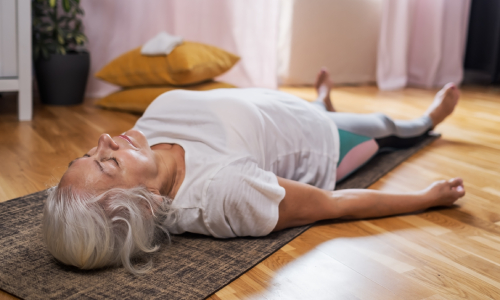The health benefits of yoga
- Overview
- 1. Yoga can increase your flexibility and balance
- 2. Yoga can build your strength
- 3. Yoga can help you sleep
- 4. Yoga can help keep your heart healthy
- 5. Yoga can help strengthen bones and ease joint pain
- 6. Yoga can help combat stress, anxiety and depression
- 7. Yoga can help improve concentration and mood
- Related articles
People who practice yoga say they feel healthier and are more likely to adopt healthy habits.1
Yoga has even been recognised by healthcare practitioners as an effective complementary treatment due to the health benefits in brings.2
Here are seven benefits of yoga, as evidenced by various researchers around the world.
1. Yoga can increase your flexibility and balance

If you want to limber up, yoga can certainly help you out. Ten weeks of biweekly yoga sessions significantly improved the flexibility and balance of American college athletes.3
But it’s not just the young and fit who can reap these benefits – a study at the University of Edinburgh found similar improvements in older adults who did yoga.4
As you age, the bones weaken and aches and pains can be more common, so improving your balance and flexibility through activities like yoga is so important in avoiding injuries from falls and muscle strains.
2. Yoga can build your strength
Many of the poses are isometric exercises, where you engage the muscles without moving – e.g. holding a chair pose or warrior pose. Whether you want to tone up or rebuild strength, yoga is a great way to strengthen your muscles.
It was found that 12 weeks of hatha yoga had a positive effect on muscular strength and endurance in Hong Kong adults.5
Similar results were found in a study on Indian Air Force personnel across a range of age groups, but also that hatha yoga can help prevent age-related muscle deterioration.6
3. Yoga can help you sleep

If you struggle to get good quality sleep, yoga may be the way forward. In a study on women with sleep problems, yoga improved how quickly they fell asleep, as well as how long they stayed asleep.7
Sleep can become more fragmented as you get older, but practicing yoga (including physical postures, breathing and meditation) has been shown to help elderly participants fall asleep quicker, sleep longer, and feel more well rested.8
Another study found that yoga nidra (a lying-down meditation where the aim is to find a deep state of conscious awareness) can be particularly helpful at managing chronic insomnia.9
4. Yoga can help keep your heart healthy
It’s been found that pranayama (breathing practices) can improve several bodily systems; the cardiovascular system benefitted considerably from slowing down the pace of breathing.10
Yoga can also improve your circulation – over 40s who’d been practicing for five years had lower blood pressure and pulse rate than those who didn’t.11
There’s evidence that yoga can even reduce your cholesterol levels and slow the progression of heart disease, when combined with dietary changes and stress management.12
5. Yoga can help strengthen bones and ease joint pain
Yoga asanas may reverse the bone loss associated with osteoporosis – a study found that just 12 minutes of daily yoga can increase bone mineral density in the spine, hips and femur.13
In terms of joint pain, a study found that 9 out of 10 patients with rheumatoid arthritis reported positive changes to their symptoms after 16 weeks of yoga therapy.14
Similarly, a study on military veterans found that chronic lower back pain decreased in intensity for those who completed a 12-week yoga programme involving postures, movement and breathing techniques.15
Yoga may even be as effective as traditional physical therapy for those with lower back pain.16
6. Yoga can help combat stress, anxiety and depression

Many people with mental health issues find solace in yoga. One study identified that people who practice yoga regularly have low levels of cortisol, one of the key stress hormones.17
Another study found that participant’s anxiety scores were significantly reduced after a 10-day yoga intervention (including asana, pranayama, meditation, yoga philosophy).18
And a meta-analysis revealed that yoga interventions, including asana as well as pranayama, were effective in reducing depression.19
Cognitive behavioural therapy (CBT) is the main treatment for stress, anxiety and depression – but where does yoga fit into this?
It’s was found that 12 weeks of kundalini yoga (including poses, breathing and meditation) improved anxiety symptoms more than stress education, but it wasn’t as effective as CBT, suggesting yoga can be a complementary treatment to CBT.20
7. Yoga can help improve concentration and mood
If you struggle to stay focused, yoga could help. A study on college-aged participants found that reaction times were shorter and accuracy increased after a yoga session, compared with aerobic exercise or baseline conditions.21
And there’s no denying yoga can make you feel good. A study on moderately experienced hatha yoga practitioners showed that hatha yoga and meditation significantly improved mood post session.22
Want to learn more about yoga?
Read How to get started with yoga: a beginner's guide and Ten yoga terms you should know.
What to try some yoga?
We offer a range of yoga classes at our gyms, or we also have few free online yoga classes you can try.
1. Yoga
practice in the UK: a cross- sectional survey of motivation, health benefits
and behaviours
2. Recommending
yoga for health: A survey of perceptions among healthcare practitioners in the
UK
3. Impact of 10-weeks
of yoga practice on flexibility and balance of college athletes
4. The effects of
yoga compared to active and inactive controls on physical function and health
related quality of life in older adults
5. Effects of a
12-Week Hatha Yoga Intervention on Cardiorespiratory Endurance, Muscular
Strength and Endurance, and Flexibility in Hong Kong Chinese Adults
6. Age related differences
of selected Hatha yoga practices on anthropometric characteristics, muscular
strength and flexibility of healthy individuals
7. The
effect of yoga on sleep quality and insomnia in women with sleep problems
8. Influence of Yoga and Ayurveda
on self-rated sleep in a geriatric population
9. Yoga
Nidra: An innovative approach for management of chronic insomnia
10. Effects
of yogic breath regulation: A narrative review of scientific evidence
11. Beneficial effects of yoga
lifestyle on reversibility of ischaemic heart disease
12. Effect of yoga on
cardiovascular system in subjects above 40 years
13. Twelve-Minute
Daily Yoga Regimen Reverses Osteoporotic Bone Loss
14. A
mixed methods evaluation of an individualised yoga therapy intervention for
rheumatoid arthritis
15. Yoga
for Military Veterans with Chronic Low Back Pain
16. Yoga, Physical Therapy,
or Education for Chronic Low Back Pain
17. Association of yoga
practice and serum cortisol levels in chronic periodontitis patients with
stress-related anxiety and depression
18. Effect of yoga based lifestyle
intervention on state and trait anxiety
19. The Efficacy of
Yoga as a Form of Treatment for Depression
20. Efficacy
of Yoga vs Cognitive Behavioral Therapy vs Stress Education for the Treatment
of Generalized Anxiety Disorder
21. The acute effects of yoga on
executive function
22. Examining the
Acute Effects of Hatha Yoga and Mindfulness Meditation on Executive Function
and Mood
Last updated Thursday 23 January 2025
First published on Friday 18 August 2023

